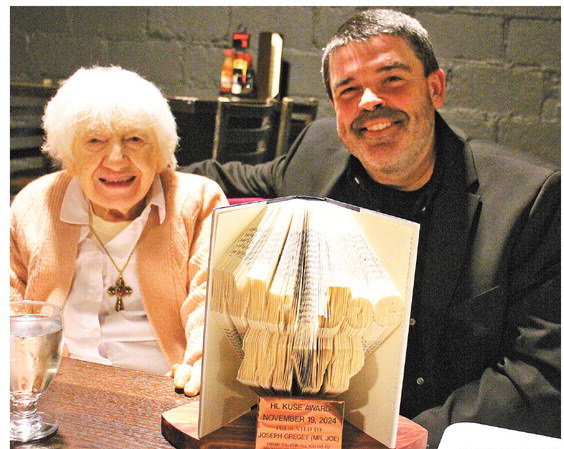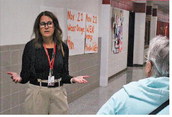Marathon Library system to keep challenged books
Two controversial sex education books will remain in the children’s sections of the Marathon County Public Library system, despite objections from parents and other concerned citizens who consider the materials to be harmful to children.
Based on the recommendations of a review committee, the library’s board of trustees voted Monday to keep in place two challenged books: “Making A Baby” by Rachel Greener and Clare Owen and “You Be You! The Kid’s Guide to Gender, Sexuality and Family” by Jonathan Branfman and Julie Benbassat.
In both cases, the committee determined that the educational value of the books outweighed the concerns over sexually explicit images and descriptions and controversial subject matter.
“The patron’s objections should not keep others from accessing the information contained within this book, as that would be in direct opposition to the library’s mission: ‘To enrich lives by promoting lifelong learning and actively providing the community with access to ideas, information and opportunities to connect,’” the review committee wrote regarding both books.
A majority of those who spoke during Monday’s public comment section asked the board to either get rid of the books altogether or at least remove them from the children’s sections.
“Please search your hearts and souls to do what is right and moral to protect little ones from harmful adult materials,” said Wausau resident Tanya Riehle. “Make our libraries safe for little ones to browse the shelves in the children’s section without risk of being exposed to adult topics that will destroy their innocence.”
Ultimately, the board sided with the review committee’s recommendations to keep the books where they are.
In the case of “Making a Baby,” committee members noted that “the publisher indicates that the target audience is children ages five to eight.” The committee also quotes the School Library Journal calling the book “straight-forward and accurate,” with illustrations that are “anatomically correct but not graphic.”
One of the images in the book depicts a couple lying in bed together with an accompanying graphic of male and female genitalia engaged in intercourse.
The committee rejected the idea of relocating or labeling the book to prevent children from accessing it as easily.
“Committee members agreed that moving the book to the adult section would make it less accessible to those for whom it is written, which is a clear form of censorship,” the report states. “They discussed the possibility of moving it to a higher shelf or affixing a label to make it evident that the book discusses human development, but concluded that either of these options would result in extra attention being given to the item,” the committee concluded.
The committee also emphasized the responsibility of parents for monitoring what their children are reading or watching at the library.
“When a parent/guardian signs up for a child’s library card at the Marathon County Public Library, the parent/ guardian acknowledges that they are responsible for determining what resources are appropriate for that child. However, they cannot infringe on the liberty of other parents/guardians to determine what is acceptable for their children or to restrict access for any individual,” the committee wrote.
In its report, the committee said it devoted “over 62 combined hours” to reviewing the book, looking at professional reviews and drafting reports to the library director and board of trustees. The report pointed out that at least 77 copies of
are available in libraries throughout Wisconsin.
Regarding You be You!, which advocates for the acceptance of homosexuality and transgender individuals, the committee said the book “celebrates all identities and lifestyles” and affirms a diverse set of family backgrounds.
“The American Library Association states that collections serving children should include materials featuring individuals ‘of minority sexualities, gender identities, and family structures,’ noting that ‘representation of these identities and families is critical for building healthy perceptions among youth,’” the committee wrote.
As with “Making A Baby,” the committee dismissed the idea of either relocating the book or giving it a warning label.
The committee noted that the book’s publisher recommends it for kids aged seven to 11, though they say it could also benefit those as young as five. It also noted that 57 other libraries in Wisconsin offer the book in their juvenile sections.
Committee members also addressed a request by the concerned patron to offer a children’s Bible as an alternative to “You Be You!” The committee noted that the library already offers a wide variety of Bibles for young people, but those may not be “comparable” to the sex ed book.
“The committee observed that if the patron is looking for a less secular presentation of human development, the library also offers books on families and gender from a Christian perspective,” the report stated.
Before voting on the committee’s recommendations, board member Reid Rayome read a letter from the Marathon County Medical Society, which came out in favor of keeping the books in the children’s sections. He said 33 doctors signed off on a statement declaring the books to “contain accurate medical information” with “scientific and educational value for children.”
Raymone also referenced a library policy regarding Free Access to Libraries for Minors. First adopted in 1986, the policy points out that the American Library Association “opposes all attempts to restrict access to library services, materials, and facilities based on the age of library users.”
The policy also cites Article V of the Library Bill of Rights, which states: “A person’s right to use a library should not be denied or abridged because of origin, age, background, or views.”
“Libraries should not limit the selection and development of library resources simply because minors will have access to them,” the policy states. “Institutional self-censorship diminishes the credibility of the library in the community, and restricts access for all library users.”




